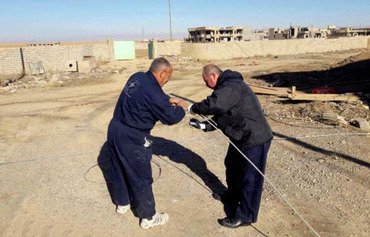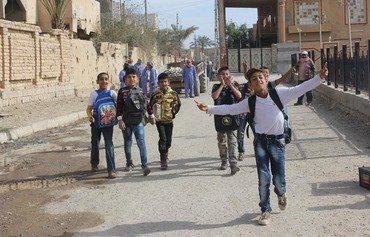Umm Ahmed placed nine large pots and an old bathtub on the rooftop and in her garden to collect rainwater during the heavy rains that fell on Mosul last week.
Meanwhile, her daughter Hanah, 17, covered the tip of big bottles with a cloth to filter the rainwater for drinking.
At least half a million people caught in the crossfire inside the Ninawa province city now have no access to running water, the UN warned on November 30th.
The "Islamic State of Iraq and the Levant" (ISIL) has deliberately cut off water supplies to neighbourhoods in the city, the 45-year-old mother said. "But God did not cut it off from us and has sent us enough water to last us a few days."
"We hope it will rain again," she told Diyaruna.
ISIL has cut the electricity supply to the water stations that feed several neighbourhoods in eastern Mosul, where Iraqi troops are advancing, officials and residents said.
Mosul residents depend on two key drinking water stations, one in the forests area in southern Mosul and the other on the left bank near al-Hawi church.
ISIL maintains control of both stations and intentionally interrupts the flow of water to residential neighbourhoods, while its own elements enjoy purified drinking water.
Unsafe drinking water
"About half a million Iraqis in Mosul are suffering from water shortage and are resorting to pumping water from wells," said Sarmad Jasem, head of the Iraqi Peace Organisation for human rights.
Drinking unsafe water pumped from wells "is causing major health problems for residents, especially children", he told Diyaruna.
Eyewitnesses inside the city have told the organisation that "ISIL is monopolising clean water for use by its own elements", he said.
Even if residents could get to the Tigris to access water, he said, "it would be useless" because the river is contaminated with oil that has seeped into the river after ISIL bombed pipelines from al-Nejme and al-Qayyarah oilfields.
Eastern Mosul neighbourhoods have been short of water for days, city resident Ammar Ahmed said, adding that people have been forced to use contaminated water as "we do not have any fuel to boil and purify the water".
ISIL's suicide bombings in north Mosul damaged the main water pipe to the city which feeds into the first water station, he told Diyaruna, adding that ISIL elements also have stolen the electricity generator from the second station.
"We have started digging six-metre deep holes in our garden to extract water, but it smells like sewage," said Mosul resident Saad Mukhles al-Hamdani.
"We have no option but to use it," he told Diyaruna, adding that they filter it through cloth so it can be used for washing and bathing.
They have been using rainwater for cooking and drinking, he said.
"Sometimes, when we hear there is a well with pure water, we head there to retrieve water from it," he said. "However, a few days ago, ISIL elements showed up when a number of us were getting water from one of the wells and drove us away. We later learned they had sealed it with concrete."
Crime against humanity
After Iraqi forces liberated several neighbourhoods in the eastern half of the city, "ISIL cut off the water from those areas and gave orders to bomb them", said Ninawa provincial council member Hossam al-Din al-Abbar.
Then it cut off the water from all other city neighbourhoods, he added.
ISIL's severing of the water supply "is a war crime against humanity and further proof that it is willing to go to any ends to kill civilians", he told Diyaruna.
"The water shortage inside Mosul is ISIL's doing," Ninawa Operations commander Lt. Gen. Najm Eddin al-Jubury told Diyaruna.
"ISIL does not allow anyone to access the Tigris, which cuts the city in two, claiming that residents of the left bank may not move to the right bank or vice versa, even when residents tell the group they only want to get water," he said.
The group has been using these types of criminal tactics to pressure Iraqi forces into halting their advance on Mosul, he said.
"We ask residents to remain patient, and we tell them the battle is almost over," al-Jubury said. "Their brothers in the eastern neighbourhoods are now enjoying well-being, after the liberation of their areas."

![Mosul residents try to collect water in an eastern district of the Ninawa province city on December 2nd. [Thomas Coex/AFP]](/cnmi_di/images/2016/12/08/6728-Iraq-mosul-water-600_384.jpg)





